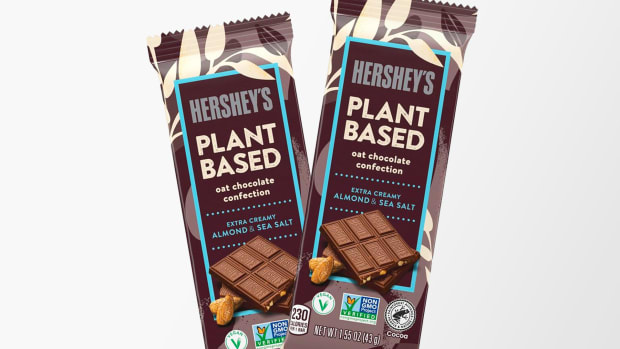
Chocolate makers and other packaged food companies are always trying to come up with new versions of their products to expand sales.
While the core products remain the same, companies have offered variations in packaging, color, shape, and more to keep their brands fresh in consumers' eyes.
Don't Miss: Cracker Barrel Makes a Change Customers Hate
But the moves can carry risks.
When certain iconic foods and popular brands go plant-based, not everyone is left feeling happy at having another option to choose from. Last August, diner chain Cracker Barrel (CBRL) generated tens of thousands of upset social media comments and caught the eye of Fox over the "very woke" decision to add plant-based breakfast sausage to its menus.
Despite being a core menu staple at many international locations, McDonald's (MCD) effort to bring the McPlant to the U.S. also failed to take off. Things don't always go off the rails, though. Chick-fil-A's test of the new cauliflower sandwich is so far escaping the same kind of mass outrage.
Hershey Makes a Big Change
The latest big snack brand to take the plant-based route is Hershey Company (HSY). On Tuesday, the iconic chocolate maker announced that it is launching a new vegan Hershey's chocolate bar made with almonds and sea salt instead of dairy. Perhaps even more remarkable, it's launching a vegan Reese's peanut butter cup.
Both chocolate products will be launching across the U.S. in the coming weeks (the Reese's product later this month and the Hershey's Plant Based Extra Creamy with Almonds and Sea Salt later in April) and are meant to give those looking for vegan products more options.
When it comes to the Reese's cups, the creamy texture is achieved through an oat, chocolate and peanut butter mixture. While "plant-based" is a term that often gets thrown around fairly loosely, the two new chocolates are officially certified as vegan.
"Our purpose is to create more moments of goodness for consumers," Teal Liu, brand manager of Better For You at Hershey, said in a statement. "Those moments are now more accessible for chocolate lovers looking for plant-based alternatives."
At least so far, the new product announcement has largely managed to escape the kind of drummed up outrage that took place when other brands tried to launch vegan or plant-based products.
Commenters underneath the announcement on different media outlets mostly say that they're "looking forward" to seeing whether the vegan version can taste the same as the regular one.

Demand For Plant-Based Products is Growing, Analysts Say
As many people in Western countries look to minimize meat consumption for both health and environmental reasons, the plant-based market is expected to grow at a CAGR of 19.3% and reach $24.8 billion by 2030.
Both snack producers and fast food companies have, as a result, been tripping over themselves to launch new plant-based products and secure partnerships with alternative meat producers like Beyond (BYND).
"To meet the changing needs of some snackers, Hershey's expertise and capabilities help us deliver more, great-tasting alternative options including portion-controlled treats, no sugar added, zero sugar, high protein and now plant based," Hershey's wrote in its announcement of the new treats.
Many products may fail to take off amid an oversaturation of different options on the market but, ultimately, demand for plant-based products remains strong and is only expected to increase in the coming years.
"As the vegan chocolate space gets more crowded, claims beyond plant-based may be necessary," Kelsey Olsen, a Mintel consumer insights analyst for food & drink, told CNN. "While many plant-based items previously launched have been dark chocolate varieties, brands should explore the areas of plant-based milk chocolate and white chocolate."







